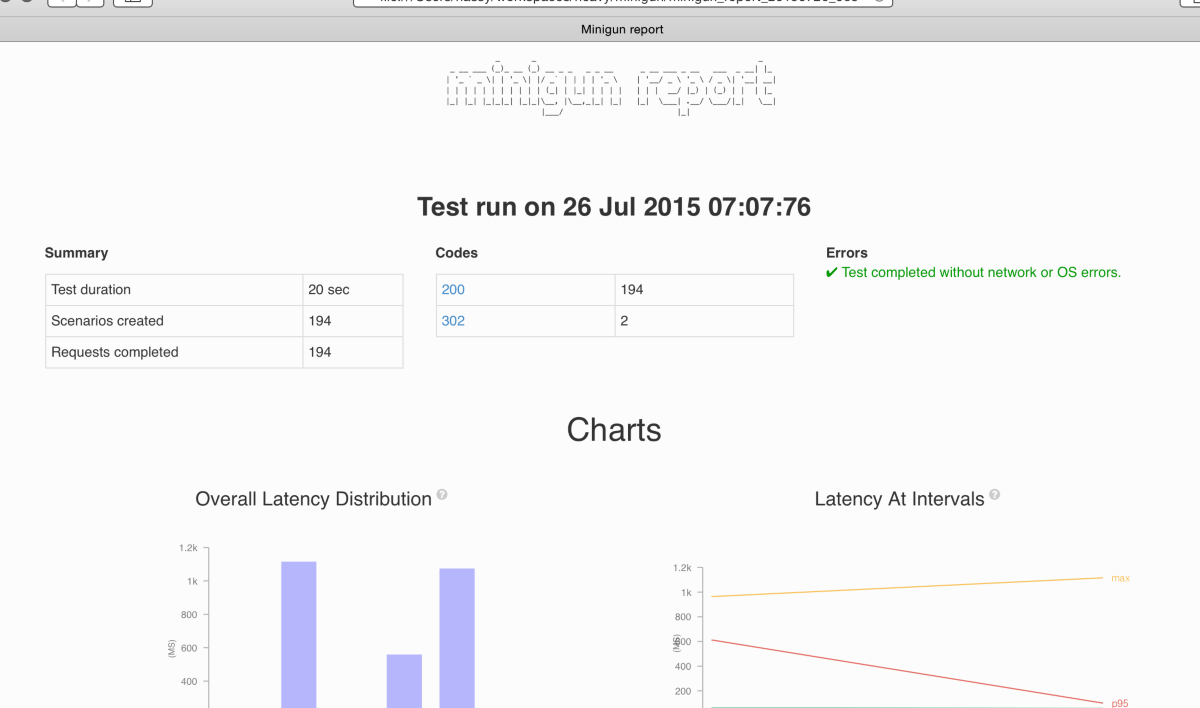_ _
(_) (_)
_ __ ___ _ _ __ _ __ _ _ _ _ __
| '_ ` _ \ | | | '_ \ | | / _` | | | | | | '_ \
| | | | | | | | | | | | | | | (_| | | |_| | | | | |
|_| |_| |_| |_| |_| |_| |_| \__, | \__,_| |_| |_|
__/ |
|___/
minigun is a simple but powerful load-testing tool designed to help you
make your apps more performant, reliable, and scalable.
http://minigun.io


Features
- HTTP(S) and WebSocket support
- Detailed performance metrics (latency, RPS, throughput)
- NEW! Graphical reports
- Test scenarios are just easy-to-read JSON - all declarative, no code (see an example)
- Dynamic payloads
- Use minigun as a standalone CLI tool or as a Node.js library
- Good performance
- Plugin support (experimental) - docs
- Open-source & free
Quickstart
Install
minigun is available via npm
$ npm install -g minigun
Run
$ minigun quick -d 30 -r 5 http://127.0.0.1:3000/test
This will run a test for 30 seconds with an average of 5 new requests to
http://127.0.0.1:3000/test every second.
Run with a more complex scenario
$ minigun run hello.json
Where hello.json is your tests script that contains something like:
{
"config": {
"target": "http://127.0.0.1:3000",
"phases": [
{ "duration": 120, "arrivalRate": 10 }
],
"defaults": {
"headers": {
"content-type": "application/json",
"x-my-service-auth": "987401838271002188298567"
}
}
},
"scenarios": [
{
"flow": [
{ "get": {"url": "/test"}},
{ "think": 1 },
{ "post": {"url": "/test", "json": { "name": "hassy" }}}
]
}
]
}
Create a report
Create a graphical report from the JSON stats produced by minigun run with:
minigun report <minigun_report_xxxxx.json>
An example: :tophat:

Use cases
- Benchmark the performance of your API or microservice as you're building it
- Ensure new code does not introduce performance regressions
- Test your code for memory leaks
- Benchmark dependencies (libraries, frameworks, external services) to get a
feel for their performance characteristics before you integrate
- Run load-tests before you launch to ensure your application can meet
projected demand
Learn More
When NOT to use Minigun
Minigun is not a web server benchmarking tool. Its sweet spot is performance
testing of applications and APIs with complex transactional scenarios.
Having said that, Minigun is capable of generating 500+ RPS on modest hardware
(a 512MB Digital Ocean droplet). Still though, if you are after raw RPS to
simply hammer a single URL, you may want to use wrk instead.
tldr:
Benchmarking an Nginx installation? Use wrk. Testing a Node.js
API, a RoR webapp, or a realtime WebSocket-based app? Use Minigun.
Design
Declarative tests
minigun test cases are 100% declarative. Your test-case describes what
needs to happen, not how it happens.
Benefits of this approach:
- Tests can be 100% reproducible, since there is no custom code.
- Test cases can be auto-generated and analysed by other tools - it's just JSON.
- DSLs can be written for any language. We have a JS DSL on the roadmap, and
one can be written easily for Ruby, Python, Lua or another language.
- Stronger performance guarantees can be made in absence of custom code.
Further reading:
Statistically-sound testing
Modeling user arrivals
minigun uses the Poisson distribution
by default to model how requests are spread over the duration of the test.
What does this mean in practice?
If you specify a duration of 60 seconds, with the arrival rate of 10, it means
on average 10 users will arrive every second, with for example 8 arrivals one
second and 11 arrivals the next. The inter-arrival period would also be
slightly different every time, i.e. 5 users arriving within 1 second (1000 ms)
would not be evenly spread out 200ms apart.
This may seem like a subtle difference, but in practice it leads to more robust
tests.
Contributing
Thinking of contributing to Minigun? Awesome! Please have a quick look at the
guide.
License
minigun is 100% open-source software distributed under the terms of the
ISC license.
Copyright (c) 2015, Hassy Veldstra <h@veldstra.org>
Permission to use, copy, modify, and/or distribute this software for any
purpose with or without fee is hereby granted, provided that the above
copyright notice and this permission notice appear in all copies.
THE SOFTWARE IS PROVIDED "AS IS" AND THE AUTHOR DISCLAIMS ALL WARRANTIES WITH
REGARD TO THIS SOFTWARE INCLUDING ALL IMPLIED WARRANTIES OF MERCHANTABILITY
AND FITNESS. IN NO EVENT SHALL THE AUTHOR BE LIABLE FOR ANY SPECIAL, DIRECT,
INDIRECT, OR CONSEQUENTIAL DAMAGES OR ANY DAMAGES WHATSOEVER RESULTING FROM
LOSS OF USE, DATA OR PROFITS, WHETHER IN AN ACTION OF CONTRACT, NEGLIGENCE OR
OTHER TORTIOUS ACTION, ARISING OUT OF OR IN CONNECTION WITH THE USE OR
PERFORMANCE OF THIS SOFTWARE.
Bonus Dinosaur
You made it all the way down here, so here's a dinosaur with a minigun:







